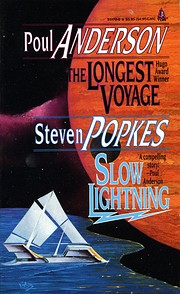

Carregue numa fotografia para ir para os Livros Google.
|
A carregar... The Longest Voyage/Slow Lightningpor Poul Anderson, Steven Popkes (Autor)
 Nenhum(a) Ainda não há conversas na Discussão sobre este livro.   ) )My reactions to reading this in 1992. Spoilers follow. “Slow Lightning”, Steven Popkes -- A story set in the shared univesre of a future, sinking Boston. The first part of this short novel was Popkes novella “The Egg” which I’d read before and liked. The rest of the story wasn’t as good though it did fill in some details of this universe. Structurally the story is very interesting. It’s three episodes (the first being “The Egg”) which could stand alone. However, the episodes are set chronologically backwards and characters from the preceding ones often show up as minor characters in the next one. In “The Egg” orphaned Ira Bloom and alien nanny Gray are the main characters. In the second story, Ira’s parents are the main characters and the tale of Gray’s discovery is told. The story ironically ends happily though the reader knows both of Ira’s parents will soon be killed in a labor dispute. The last story tells how Ira’s aunt and mother became orphans. Through this all runs the theme of duty, duty to family and friends and love. "Love of family, love of work, love of duty” says alien philosopher Gray, and in that order. The troubled relationships of “The Egg” between Ira, aunt Roni and his cousin and Gray are resolved, knitting all into a family. In the second story, Roni and Gilbert Bloom’s relationship is explored as they try to find work at Maxwell Station. The third story is the most complicated working of this story. Peter S. Croix, protagonist of the story and Ira Bloom’s grandfather, must choose between desire to save himself and his family and his loyalty to smuggle Lat Do whom the Boston authorities are going to come down hard on. Lat Do has married and cared for Croix’s maimed sister (he blames himself for the farming accident responsible). It is also in this story that a couple of other threads running through the novel are especially prominent. First is the strange stylistic device of having non-present (usually dead but not always) people hanging around the protagonist giving advice like some Roman tutelary family spirit. This device is never rationalized. In the first story, Ira’s dead parents talk to him. In the third story, Peter Croix hears the fiery voices of his ancestors involved in the 1885 Metis rebellion in Canada. They are urging him to stay and fight the Boston authorities he knows will come. Yet he’s trying to work out an reapproachment between Boston and Lat Do with the mysterious Bishop 24. The Bishop is very influential amongst Earth’s aliens. The Bishop has been manipulating affairs to support Lat Do’s high tech smuggling ring as a counterweight to the alien trading blocs. He is about to buy out so the Earth authorities won’t touch it. But the Police Commissioner acts too fast and moves against Lat Do before the deal can be finalized. Lat Do suspects betrayal by the Bishop, dies trying to kill him. Marie, Lat Do’s wife and Croix’s sister, is killed by Croix when she trys to kill the Bishop. (This is prefigured by Lat Do killing his brother who trys to rape Roni Bloom. Both acts are seen as familial duty, Chamcha as the Bishop calls it). The Bishop, Croix realizes, is too important to be killed since he is looking out for Earth’s interests. This is what the Bishop calls Rhamcha, a Holy moral sacrifice. It is because of Croix’s sacrifice that the Bishop manipulates things so Gilbert can get a job on Maxwell Station and find Gray. Bishop betrays his own people to find Gray whose family he betrayed and had destroyed. This is Chamcha. Gray does not know this and seems to hate the Bishop when they meet in “The Egg”. This convoluted tale of sacrifice and duty through three generations of humans was interesting. The central character, the enigmatic, strange centaur Bishop 24, was the best part of the story and one of the best parts of the series. However, Alexander Jablokov’s “The Place of No Shadows”, in which the Bishop isn’t present, is still my favorite installment. “The Longest Voyage”, Poul Anderson -- The ending, where Captain Rovic decides to blow up the star ship so the inhabitants of his world will explore their planet before venturing to others, was not a surprise. Nor did it strike me particularly hard emotionally. I’m not sure Rovic’s reasoning is solid. The circumnavigation of the world was obviously based on Magellan, and Rovic was kind of a Sir Francis Drake character with bits of Scottish culture and nomenclature thrown in. Anderson once again doing a competent job of blending his knowledge of history into sf. sem críticas | adicionar uma crítica
Pertence à Série da EditoraTor Double (30) Contém
Captain Rovic meets a shipwrecked traveler who claims to be on an even longer voyage than his; Ira and Gray find a mysterious egg on an abandoned ferryboat, and when it hatches, it begins wreaking havoc. Não foram encontradas descrições de bibliotecas. |
Current DiscussionsNenhum(a)
 Google Books — A carregar... Google Books — A carregar...GénerosSistema Decimal de Melvil (DDC)813.54Literature English (North America) American fiction 20th Century 1945-1999Classificação da Biblioteca do Congresso dos EUA (LCC)AvaliaçãoMédia: (2.67) (2.67)
É você?Torne-se num Autor LibraryThing. |
||||||||||||||||||||||||||||||||||||||||||||||||||||||||||||||||||||||||||||||||||||||||||||||||||||||||||||||||||||||